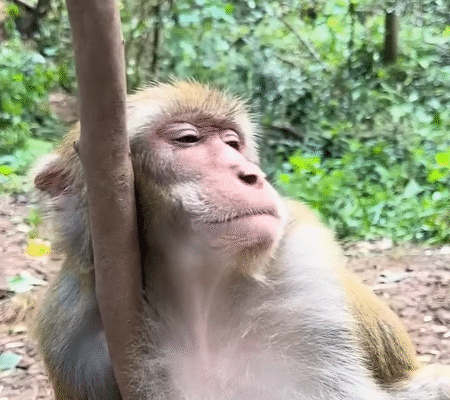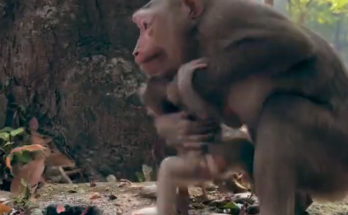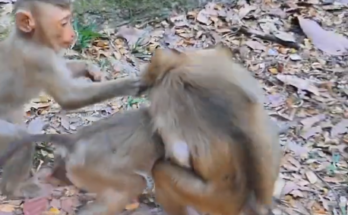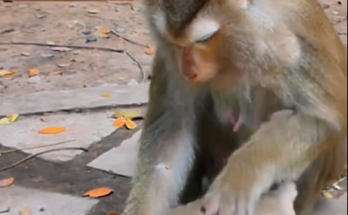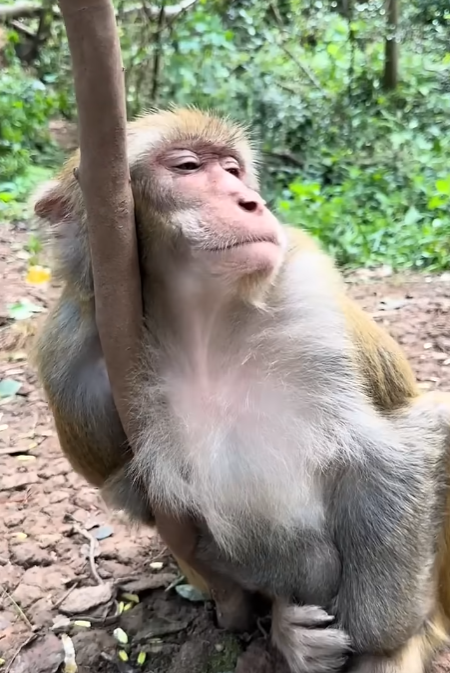
The little village at the edge of the jungle was alive with its usual morning buzz: chickens clucking, children laughing as they ran barefoot along the dusty paths, and the distant sound of a river whispering through the trees. But for one unusual resident, the morning had a different kind of charm. He was small, furry, and mischievous, with eyes that sparkled with cleverness, and today, he was about to give the villagers—and anyone who watched him—a lesson in comedy and charm.
Meet Bobo, the monkey. He had arrived at our home a few weeks ago, an orphaned baby left behind by the dense, mysterious jungle. At first, he had been timid, clutching his little blanket and watching us warily. But it didn’t take long for Bobo’s true personality to shine. He was mischievous, curious, and smart beyond what one would expect from such a tiny creature. He could open doors, steal fruit from the kitchen, and even mimic the villagers’ gestures in a way that made everyone laugh.
But his latest trick was something entirely new.
I found him this morning sprawled on the mat in the sun, limbs twisted in a way that would have seemed impossible for any human. His tiny chest rose and fell with slow, exaggerated breaths. I knew immediately: this wasn’t just sleeping. This was performance art. Bobo had discovered the magic of “acting asleep,” and he was about to entertain the entire house without a single word.
I crouched quietly, trying to suppress my laughter. His eyes, though closed, twitched occasionally, giving the illusion of deep, innocent slumber. But every so often, his little hand would twitch toward the basket of bananas, or his ears would perk up as if hearing an imaginary noise. It was theatrical genius. I had to admit, the monkey had a flair for comedy.
My younger sister, Mei, walked in, humming a tune and carrying a cup of tea. She froze when she saw Bobo, her eyes widening. “Oh no,” she whispered, “he’s sleeping again… in that ridiculous way!”
I shook my head, smirking. “Not sleeping. Performing.”
Bobo’s chest rose higher, then fell, exaggerating every breath as if the sun itself depended on his nap. Mei tried to sneak closer to peek at him without waking him, but Bobo, the master of subtlety, twitched his fingers at exactly the right moment to knock over a small bowl of rice. The clatter was soft but perfectly timed, as though he had rehearsed it. Mei jumped back in mock horror, and I couldn’t stop myself from laughing.
Minutes passed, and Bobo’s “performance” continued. He shifted from side to side, his tail curling dramatically around his tiny body. At one point, he let out a tiny snore that sounded suspiciously like a human sigh, almost as if he were saying, “Life is so exhausting, I simply cannot.” Then, when the dog wandered too close, Bobo twitched one eye open ever so slightly, just enough to make it look like he was startled awake before rolling back onto his back, arms flung wide, giving the impression of utter vulnerability.
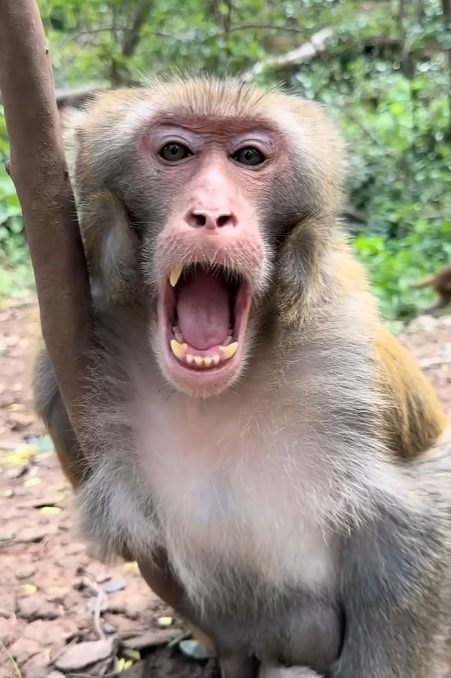
It wasn’t long before the entire village got wind of the funny sleeping monkey. Word spread quickly: “Come see! The monkey that acts better than humans!” Children arrived first, their giggles echoing through the courtyard. Then, curious adults came, each trying to get a glimpse of this tiny star. Bobo, sensing the attention, escalated his performance.
He started flopping dramatically onto his side, legs splayed, then curled into a tiny ball like a living stuffed toy. He yawned with exaggerated timing, dragging one tiny hand across his face as if the sun itself had made him weary. At one point, he rolled over entirely, landing on his tummy, then immediately lifted his head and peeked at the audience with a sleepy, innocent gaze that made everyone laugh so hard, some of the villagers doubled over, clutching their stomachs.
The highlight came when Bobo “dreamed” of a banana he had stolen the day before. He twitched his arms wildly, kicking at the air, as if wrestling with the invisible fruit. Then he opened one eye, looked around slyly, and rolled over as if saying, “Don’t mind me, I’m just asleep!” It was comedic timing at its finest. I couldn’t help but clap along, marveling at the monkey’s instinct for humor.
Even the family dog, Max, seemed entranced by the performance. He circled Bobo, sniffing curiously, only to jump back when Bobo flopped sideways in a dramatic sprawl. It was like watching a tiny actor rehearsing for a role in a jungle theater, with every twitch and snore perfectly choreographed.
By mid-morning, the “show” had become a full-blown event. Villagers brought chairs and sat in a semicircle around the mat where Bobo lay. He seemed to understand the audience, performing with different nuances each time someone new arrived. To some, he pretended to be completely unconscious, snoring lightly. To others, he twitched and rolled over dramatically, eliciting laughter. His little eyes glimmered when he peeked, confirming that the audience had fallen for the act—again.
I realized something in that moment. Bobo wasn’t just a monkey; he was a comedian, a performer, and maybe even a tiny philosopher. In his funny, sleeping antics, he reminded us that joy could be found in the simplest moments. That laughter didn’t always require elaborate planning, only attention to the details of life and a willingness to exaggerate them just enough to make others smile.
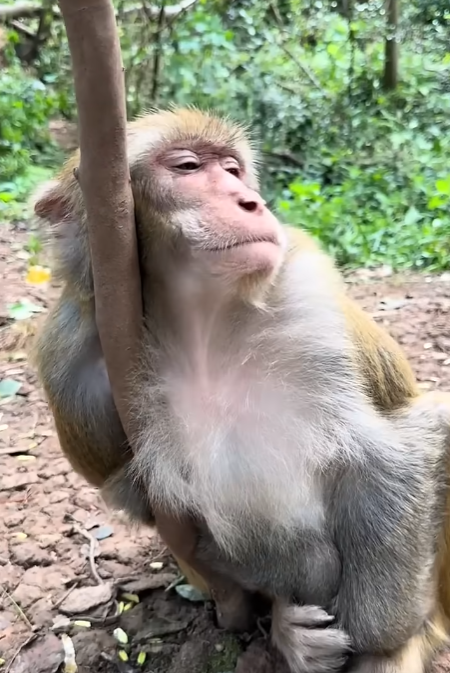
Hours passed, yet Bobo showed no signs of tiring from his comedic role. Eventually, he rolled onto his back one last time, closed his eyes fully, and pretended to snore with the utmost seriousness. The audience, convinced he was truly asleep, tiptoed away, shaking their heads with grins. Only I knew the truth: this little monkey had staged the performance flawlessly. He had made the entire village laugh without a single word, using only the universal language of mimicry, timing, and charm.
When the crowd dispersed, Bobo opened his eyes slowly and yawned. He crawled over to me, stretching and giving a little satisfied grunt. It was as if he were saying, “Well, that went well, don’t you think?” I scratched behind his ears, laughing. “Yes, little star. You were perfect.”
He flopped onto my lap, curling his tail around my arm, and finally—truly—fell asleep. But even then, I couldn’t help but watch him with admiration. The funny sleeping good acting monkey had captured hearts, brightened mornings, and reminded everyone that sometimes the best performances don’t require words at all—just a little courage, creativity, and a sense of humor.
From that day forward, Bobo became a legend in the village. People would come from afar just to watch him nap “comically” in the sun, pretending, twisting, and occasionally waking in dramatic fashion. And every time he did, laughter filled the air, hearts felt lighter, and the simple joy of a monkey’s antics reminded everyone that happiness often arrives in the most unexpected forms.
And as I sat beside him, stroking his fur while he pretended to sleep, I realized one undeniable truth: no matter how wild, mischievous, or unpredictable life might be, there will always be a little funny monkey somewhere, ready to teach us that laughter is, truly, the best part of every day.
